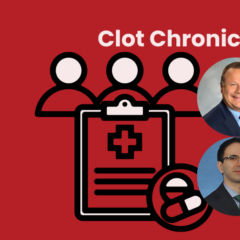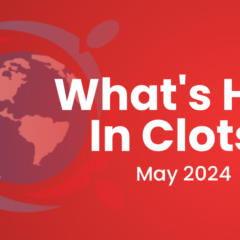Last updated on
What’s Hot in Clots – February 2024
Key Updates in Thrombosis
Table of Contents
There was a good mix of interesting publications in the field of thrombosis last month.
When should we use/not use DOACs?
Direct oral anticoagulants (DOACs) have been a major breakthrough for many clinicians who treat patients who have had—or who are at risk of—thrombotic or thromboembolic events. However, they are far from being a wonder (class of) drug across the board. This paper provides a systematic overview of scenarios in which there is ample evidence of the safety and efficacy of DOACs, but also those in which there has been major concern about safety, efficacy, or both (e.g., mechanical heart valves, rheumatic atrial fibrillation (AF), and thrombotic antiphospholipid syndrome). We also share information about the areas of uncertainty and where we need more studies. Read more.
Interventional therapies for PE: What have we learned recently?
Another welcome addition to management of thrombotic conditions in the past 2 decades has been the plethora of interventional (mostly endovascular) therapies for pulmonary embolism (PE). These therapies span from approaches to using fibrinolysis at lower doses, to thrombectomy devices, percutaneous mechanical circulatory support, and others. A recent review paper summarizing options for high-risk PE—and a prospective registry that describes routine practice outcomes with a catheter-based fibrinolytic therapy option—add to our knowledge base. The most important questions are whether these endovascular procedures help patients live longer, better, or both compared with anticoagulation alone, and—when they are needed (for high-risk patients)—which procedure is right for which patient. Results from a few ongoing randomized controlled trials (RCTs) will be most informative. Time will tell! Read more here and here.
Combination of AF and obesity: What can we learn from COMBINE-AF about risk and treatment?
COMBINE-AF is an individual participant pooled database from four RCTs of DOACs versus warfarin in patients with AF. In this paper, the authors report the association between obesity and outcomes, as well as the treatment effect of DOACs versus warfarin across the spectrum of body weight and body mass index (BMI). Briefly, the stroke risk was lower in patients with higher BMI. The risk of stroke or systemic embolism was lower with DOACs versus warfarin, without evidence of effect modification according to BMI or weight. It is noteworthy that even in this huge database, only a small number of patients had a BMI. >45kg/m2. Read more.
AXIOMATIC-SSP: Axing the enthusiasm for XI/XIa inhibitors?
Nearly a year ago, there was much excitement about factor XI/ XIa inhibitors as a class of drugs that could dissociate thrombosis from hemostasis (i.e., preventing clotting without paying the price for bleeding). However, these drugs have taken a hit (or two) with the OCEANIC-AF trial being halted prematurely for inferior efficacy (compared with apixaban), and now AXIOMATIC-SSP not showing a reduction in stroke or silent infarct as add-on to DAPT in patients with recent stroke or TIA. Without a crystal ball, my best guess is that these drugs will eventually have a place for some patient subgroups, but will not supplant DOACs (or warfarin) in all indications. Read more.
For more updates, be sure to subscribe to get the latest updates each month.
Find this information helpful? Please consider making a small donation in support of thrombosis education & resources.

Behnood Bikdeli, MD, MS
Cardiologist, Section of Vascular Medicine, Division of Cardiovascular Medicine, Brigham and Women’s Hospital
Investigator, Thrombosis Research Group, Division of Cardiovascular Medicine, Brigham and Women’s Hospital
Instructor, Harvard Medical School
Investigator, Yale/ YNHH Center for Outcomes Research and Evaluation, Yale School of Medicine
Investigator, Cardiovascular Research Foundation



